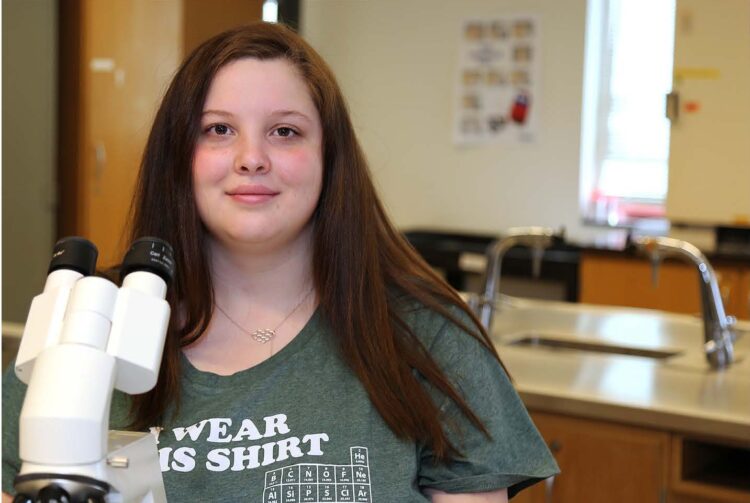(Butler, PA) A Butler County Community College president’s scholar attributes her selection to a National Science Foundation-funded residential research program in Virginia to a novel genetic sequencing project required in a freshman-level BC3 biology course.
Hope Miller, 19, of Butler, a biological science major, is one of 10 students nationwide to be chosen by James Madison University in Harrisonburg for its inaugural research experience for undergraduates for those in their first year at a community college.
The students are researching one field for 10 weeks. Research fields include structural biochemistry and enzymology, computational neurobiology, and molecular analysis of nociception.
Miller began her research of visual neuroscience May 23.
“A unique experience at BC3”
The 2020 graduate of Butler Area Senior High School said a BC3 principles of biology I course she took with Professor John Ripper highlighted her application for the program.
“I definitely have had a unique experience at BC3 because Mr. Ripper had us do some interesting things,” Miller said. “I think that set me apart from some of the other applicants.”
Eight students in Ripper’s course last fall completed novel DNA sequencing over a month for three varieties of the morning glory plant.
GenBank is a database sponsored by the National Center for Biotechnology Information and part of the U.S. National Library of Medicine. GenBank on Feb. 2 published the BC3 students’ findings – three slightly varying arrangements of 613 lower-case a’s, t’s, c’s and g’s in groupings of 10 and in rows of 60.
Each of the three arrangements of the nucleotides adenine, thymine, cytosine and guanine defined the differences – and similarities – among the fire vine, the Mexican morning glory and the cardinal climber.
“This data is collected across the world so we can determine how things have evolved and how things are related,” Miller said. “It’s a big deal because these are new sequences that no one has published before. And it is especially impressive because we were freshmen who did it.”
Among the BC3 names published by GenBank as researchers who discovered the sequencing: Miller, H.
“In most cases,” Miller said, “freshmen can’t say that they have published anything.”
BC3 prof lauds access to resources
Genetic sequencing as part of his curriculum likely elevated Miller above other first-year community college applicants to the residential research program, said Ripper, a BC3 educator for 26 years.
“One of the good things about BC3 is the small class size and access to resources that students at larger institutions don’t necessarily have,” Ripper said. “I think it is unique that our freshman students are participating in DNA sequencing work that is novel. … (Miller) clearly stood out from a very competitive field. The strength of her candidacy lies in her incredible potential and work ethic.”
Having the ability to conduct genetic sequencing in a student’s first or second year of college is “fairly unusual,” said Matt Kovac, BC3’s dean of science, technology, engineering and mathematics.
“In fact, probably highly unusual,” Kovac said, “and then there is having your name published as part of a group that found a unique genetic characteristic. I would challenge one to show me another community college or even some four-year colleges and universities that afford first- and second-year students that opportunity.”
As part of her visual neuroscience research this summer, Miller said she will observe the process of cell death in the eyes of a common fruit fly and the effect on the fruit fly’s brain.
“In a lot of cases, when you are doing research on other organisms, it’s to figure out how it works in humans,” Miller said. “If you find out how that works in a fruit fly or in a mouse, you can apply that to humans and keep the cells in your eyes from dying and also figure out how to stop certain diseases of the eye and blindness.”
BC3 dean: Opportunities competitive, prestigious
Student researchers at James Madison University will receive housing and meal allowances, and a $6,000 stipend.
“This is an honor because only a few people were selected,” Miller said. “And it’s such a huge deal because it is a unique program. It sets people apart when they are applying for professional programs for four-year colleges.”
Added Kovac: “These research opportunities are highly competitive. … They are very prestigious and hard to get.”
Miller’s goal is to become a neurologist.
She intends to graduate from BC3 in May 2022 and transfer to Clarion University of Pennsylvania to pursue a bachelor’s degree in biology with a pre-med track.
“One of the things that I appreciate about BC3 is that we have been given the latitude to develop a curriculum and the resources to implement that curriculum in the laboratory,” Ripper said. “We’ve been given the latitude and those resources to not just keep pace with other institutions, but to lead other institutions in terms of the kind of experience we can offer students.”
President’s scholars such as Miller at BC3 receive full-tuition reimbursement for up to 18 credits per semester. Reimbursement is renewable for up to four consecutive semesters. Eligible students must be a Butler County resident, be a current-year graduate in the Top 10 percent of their class at a Butler County public high school and with at least a 3.5 grade-point average.
Among other eligibility requirements are that recipients must also enroll and continue as a full-time student at BC3 following their high school graduation, participate in the BC3 Scholars Program and maintain at least a 3.5 GPA.
Miller has been named to BC3’s president’s list, for those with a grade-point average of 3.75 or higher during a semester in which they attained at least 12 credits.
Congress created the National Science Foundation in 1950 as an independent federal agency to, among other objectives, promote the progress of science.
The National Science Foundation states that it funds approximately 25 percent of all federally supported basic research conducted by colleges and universities in the United States.





